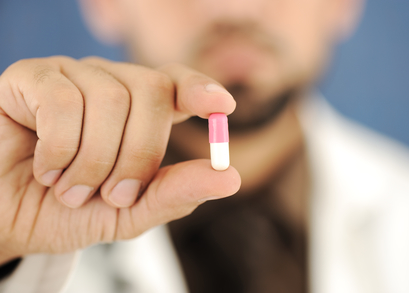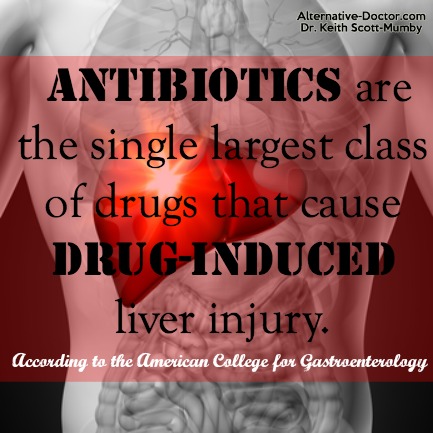Antibiotics And Sudden Death
I’ve talked before about the dangers of antibiotics. Not just the fact that they are becoming ineffective, due to multiple drug resistance by bacteria…
I’m talking about antibiotics actually killing people.
According to the American College for Gastroenterology antibiotics are the single largest class of drugs that cause drug-induced liver injury. In fact, this complication accounts for about 13 percent of cases of acute liver failure and is the most common cause of death from acute liver failure.
What should be really scary is that in about three quarters of the cases (73%), this happened after a just a single prescription medicine, not as a result of long-continued use.
Lead author of an important 2008 study Dr. Naga P. Chalasani and colleagues found that antibiotics accounted for about 45% of cases of drug induced liver injury. The next most common offenders–nervous system agents—accounted for only about 15%.
Now another new study has shown how deadly certain antibiotics can be. A widely used modern antibiotic trimethoprim-sulfamethoxazole, when used in tandem with spironolactone, a diuretic used to treat patients with heart failure, can more than double an older patient’s risk for sudden death, according to results from a Canadian study. The study was published online February 2, 2015 in the Canadian Medical Association Journal. This drug combination is sold as Bactrim, Septrin and is also known as co-trimoxazole.
Double the risk is pretty bad. But my concern goes wider than this. OK, they’ve unearthed a killer link, after many decades.
Both drugs have been used for a long time, yet this problem has only just come to light.
So, to me, the obvious question is: what other, as yet undiscovered, reactions are out there?
How safe are antibiotics really, for the elderly (or anyone else)? In other words, what I am saying is, this could be just the tip of the iceberg.
In fact, the study authors commented:
“Trimethoprim–sulfamethoxazole and spironolactone are commonly prescribed medications, and the likelihood of co-prescription is high.”
They thought it likely that physicians might overlook the dangers of antibiotics in patients with heart disease, mistakenly attributing deaths to heart disease, rather than hyperkalemia (a potentially fatal increase in potassium). In other words, the real figures in clinical practice, are probably scarier still.
So once again, leaning on antibiotics for safety is a fool’s game.
It’s particularly foolish, when there are so many viable alternatives. And I don’t mean patty-cake alternatives; I mean real working highly effective antibiotic alternatives. These include herbs of all kinds, homeopathics, inorganics (like silver and hydrogen peroxide), essential oils, colostrum and even electronic devices of several kinds.
If you don’t already have a copy of my comprehensive guide to effective and safe antibiotics alternatives, then you need to get a copy… NOW. It might save your life or that of a loved one.
It’s called How To Survive In A World Without Antibiotics and you can get a copy by clicking here.
What Can You Do To Get Away From the “Antibiotics Mentality”?
It’s important to get away from the “antibiotics mentality”, the idea that antibiotics drugs are a quick, safe and effective treatment for infectious conditions. We’ve been lulled into thinking of these drugs in that way, because they often do perform outstanding miracles, saving lives when all looks lost.But it’s a lazy mentality and, as you can see, potentially very dangerous. I am often appalled to find that doctors all around me will choose highly toxic antibiotics as a first choice, like cephalosporins (Keflex) and aminosporins (Gentamycin), preferring these over the much far safer penicillins.
 Taking one of these medications places you at increased risk of liver injury; however taking two or more of these medications at the same time increases the risk substantially.
Taking one of these medications places you at increased risk of liver injury; however taking two or more of these medications at the same time increases the risk substantially.
Ideally you would not need to take these medications at all, or for very long because you maintain a healthy lifestyle. Unfortunately sometimes it is unavoidable and you must take one or more of these medications.
You can reduce the risk of your liver being harmed by following appropriate advice from another of my books called Love Your Liver.
Liver Function Tests
Don’t wait until you turn yellow! (jaundice).
In most cases liver damage can be assessed with a simple blood test called a liver function test. This test measures the levels of 4 different enzymes present in liver cells. If your liver cells become damaged, the enzymes leak into your bloodstream and give an elevated reading on a blood test. So high readings on any of these may spell trouble:
- AST (aspartate aminotransferase). The normal range is 5-45 U/L
- ALT (alanine aminotransferase). The normal range is 5-45 U/L
- AP (alkaline phosphatase). The normal range is 30-120 U/L. AP is sometimes raised in non-liver related conditions.
- GGT (gamma glutamyl transpeptidase). The normal range is 5-35 U/L
If you have recently finished a course of antibiotics, or you have been taking them long term, I recommend you ask your doctor for a liver function test to check on the health of your liver. Don’t take NO for an answer: show him or this study reference!
Other High Risk Drugs
Besides antibiotics, a number of other medications also have the potential to cause liver inflammation; these include:
- Anticonvulsants, such as drugs used to treat epilepsy.
- Oral antifungal medication.
- Cholesterol lowering drugs called statins.
- Acetaminophen (paracetamol).
- Lithium (for bipolar)
- Isotretinoin (Accutane or Roaccutane) used to treat severe acne.
Of the other antibiotics in the study, ciprofloxacin and nitrofurantoin also showed an increased risk compared with amoxicillin (a common safe penicillin).
Your Kidneys Are Also At Risk
Thing is, some of the drugs that were also investigated could cause kidney damage.
That’s entirely logical and, as I have pointed out before, your liver and kidneys are basically your “filtering system”, taking out dangerous toxins and eliminating them.
What appears to have happened for the sudden death cases was that kidney filtering got out of balance. Potassium levels became unsafe (excess potassium stops your heart dead in seconds).
We know that happens. In fact investigators had found in a previous study that trimethoprim-sulfamethoxazole, combined with spironolactone, was more than 12 times likelier than amoxicillin to cause dangerously raised potassium levels. So that looks like the smoking gun.
You would not believe how delicately balanced your kidneys are and how stupid and abusive it is to your kidneys to pour alkaline substance into your body. This forces your kidney to work hard, to try and compensate for this folly.
Basically, the body exists within a very tiny range of acid-alkali balance and if you try and “cheat” by swallowing alkaline water or too much alkaline food, your kidney are forced to work hard to correct this imbalance.
You cannot solve a destructive and unhealthy lifestyle by swallowing alkaline water, whatever the phony sales people claim.
Alkalizing May Kill You
Forget the “alkalize or die” myth. It’s alkalize AND die. Nature is a lot smarter than people who peddle phony water alkali water, like Kangen. Leave her to do her thing; eat a variety of foods and live like a caveman, not a network marketer!
Finally, you need my book on kidney health: The Waters Of Life.
It’s a title I took from a lovely novel about rural France by Marcel Pagnol! (It was made into two wonderful movies: Jean De Florette and Manon Des Source, starring Yves Montand).
My message is central to health and longevity. You need your kidneys’ you’ll die quickly when they pack up. That’s what happened to Jane Austen (novelist), Jack London (novelist), Greta Garbo (film actress), Julia Childs (celebrity chef), Ernest Borgnine, Alfred Hitchcock and Laurence Olivier, to name just a few famous people.
Agrichemicals can also be to blame. Sri Lanka, a country I love much, is troubled by the fact that over 20,000 people have died of kidney failure. Pollutant chemicals are blamed. (A report published by the World Health Organization two years ago could not find a clear cause for the disease, though it pointed to cadmium, pesticides and other factors, such as arsenic, as possibilities).
Something similar is at work in South America, among young agricultural workers. At least 20,000 people have died prematurely in Central America in the last two decades, but the real scope of the problem is unknown. The illness is not related to diabetes or hypertension — drivers of kidney disease in the United States — and affects primarily young men. Something else is trashing their kidneys.
You can’t survive long without functional kidneys!
So finally, for safety sake: Get yourself a copy of The Waters Of Life.
By the way, click here if you want the liver and kidney books together, there is a money-saving deal.
I leave you with a lot of reading to do! Enjoy! You’ll live far longer because of it…
